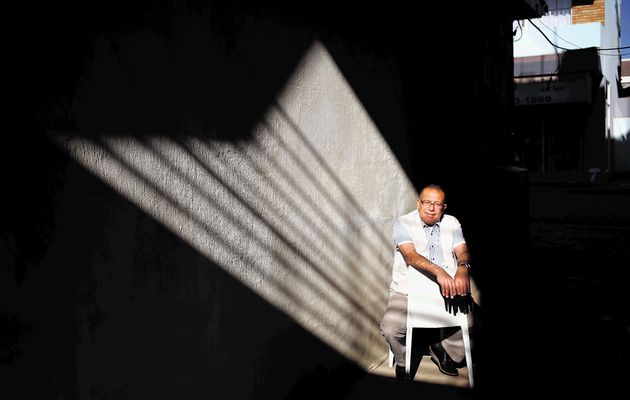In fact, he says he would rather be a Palestinian refugee in Israel than in Syria, Lebanon or Jordan.
He blames Jordan for removing 500 people from the old city in Jerusalem in 1966 and creating the camp he lived in for 33 years.
Eid lived in a 24m² house in a crowded camp and when he was a child there was no electricity for about five years: “We struggled.”
He could afford to move into an apartment in Israel only in 1999 when he won international financial awards for his human rights work with Palestinians.
“Israel is not an apartheid state,” he said. “It’s a democracy.
“Arabs are treated at the best hospitals and study at the best universities in Israel. Did that happen [to black people] during apartheid?” he asks.
Eid has been brought to South Africa by the SA Jewish Board of Deputies, the Zionist Federation of SA and other Jewish organisations to counter the messages being put out during Israel Apartheid Week.
He said that outside interference and calls for boycotts of Israel make the Palestine -Israeli situation worse.
Israel Apartheid Week, which began on Monday, has pro-Palestinian groups comparing the treatment of Palestinians to the oppression of blacks in South Africa during apartheid.
Organisations that support the week use it to call for a boycott of Israeli products to force Israel to its knees.
This, said Eid, will lead to the “genocide of Palestinians”.
The Boycott Divestment and Sanctions Campaign wants factories in Israeli-occupied territories on the West Bank closed but this would result in Palestinians losing their jobs, he said.
Following pressure by Boycott Divestment Campaign in Europe, the Israeli-owned Soda Stream factory on the West Bank closed in October.
Eid says this led to 900 Palestinian job losses, with 1300 more expected this month. But independent media reports cite 500 Palestinians as losing their jobs.
His main message is that Israelis and Palestinians need to solve the long-running conflict and outsiders’ interference only “adds oil to the fire”.
He slammed South Africans for comparing Israel to apartheid South Africa, saying it was inaccurate and added to the existing hatred between Israelis and Palestinians.
What the two groups need, he believes, is a truth and reconciliation commission similar to South Africa’s to build bridges, not more hate.
He criticises his own people for having a “backward culture”, calling it “primitive”.
His father and he were taught the same things at school.
“That’s not progress.”
“Arab culture is based on religion,” said the practising Muslim. “We still see Christian and Jewish people as godless.”
All Arab countries are run by dictatorships, he said.
He is frustrated by what he sees as the self-defeating actions of his people.
“Palestinians have, since the 1970s, been experts at losing every opportunity offered them to have land for a Palestinian state,” he said.
The leaders of the Palestinians, Fatah, on the West Bank, and Hamas, in Gaza, do not respect human rights, do not have elections or democracy, and are dividing the Palestinians, Eid said.
“Normal countries use weapons to defend themselves from enemies. Hamas, ruler of Gaza, uses civilians to defend itself,” he said disgustedly.
The UN said that in at least three instances in July, during the conflict between Gaza and Israel, it found weapons stored by Hamas supporters at UN schools in Gaza, making the schools targets for Israeli missiles.
“Palestinians have been suffering for the past 66 years and nobody – neither the Arabs nor the Palestinian leadership – give us any kind of help.
“This is the main reason I am so angry and also so upset.
“I don’t want my children to have the same kind of life as I did.”
He says the Palestinians’ plight will get worse.
‘”Our situation is more and more complicated. The world is more worried about Islamic State and other terror groups now.”
He said the world will ignore the Palestinian-Israeli conflict.
Eid said Palestinians in Gaza should get rid of their leadership, still in power after being elected for a four-year term in 2006. Elections were due in 2010 and have not been held.
“Palestinians are desperate for democracy.”
http://www.timeslive.co.za/thetimes/2015/03/04/a-fresh-look-at-an-old-problem









